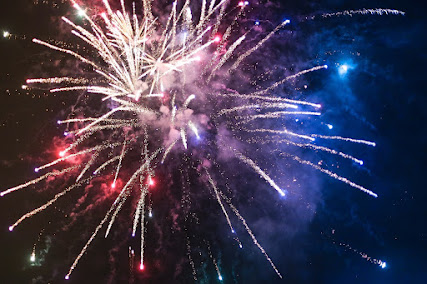Through the Perspective of History
A young person said to me recently that he'd nearly lost hope because everything seemed like it was crashing down. The world seems headed for doom -- economically, politically, spiritually. He's hardly alone in this observation. Even older people, who have experienced more and have other crisis points to compare with the present day, express the same fears.
I pointed out to him that it has always been this way. History is full of struggles interspersed with brief moments of comfortable prosperity, and every generation has said things like what is this world coming to? and kids today are disrespectful/don't have a work ethic/are irresponsible, etc, in my day we did things differently.
What we need, now, is a bit of perspective -- and not just our own. We need the perspective of history.
Imagine life for young people one generation ago. For me, that's the era 1930-1970 or so (I was born in 1968). They were born into the Great Depression, and even for people who weren't homeless in the city and standing in soup lines, trying to find work just to earn a few cents a day... or forced to leave their farms after one too many dust storms in Oklahoma (read the Grapes of Wrath), it was a terrifying time. If all you know about the era is what you were taught in high school history class, you owe it to yourself -- and all of the people who lived through it -- to learn more.
Next up was World War II, also a terrifying time. Young men were drafted into the military and far too many never made it home alive. For a while, there were no guarantees the Allies (that's the good guys) would prevail over the Axis powers (Germany, Italy, Japan). No guarantees the U.S. cities wouldn't be bombed like London in the Blitz (look it up) or fall under a communist regime. Here in the U.S. we didn't have to ration as much as Europe, but there were ration books and you had to get by with less food, clothing, gasoline, and other consumer goods. You couldn't buy them even if you had money. People saved scrap metal and cooking fats to recycle for the war effort (it was used to produce glycerine for bombs). Sounds like a pretty tough time.
Next was the Korean War, another opportunity for Americans to send their sons into battle whether they wanted to or not (see M*A*S*H* 4077th as a pop culture reference... this was my father's war) followed by Vietnam. We grew up in a time of relative peace, prosperity, and safety, marked only by the Cold War, a time when we were scared we'd be blown to bits by a Russian nuclear bomb which, we were told, would be 1,000 times worse than Nagasaki and Hiroshima.
Oh, and there were also polio epidemics to contend with -- worse than Covid-19, especially since it mainly affected children between 5 and 15. Five percent of its victims died, but over 35% were left with irreversible paralysis. The vaccine wasn't available to the public until 1963. It took nearly 30 years to develop, 10 years of which was testing and trials, and yes, the vaccine killed and paralyzed many patients along the way before it was finally deemed safe.
That's just one generation.
Go back another generation -- 1900 to 1940, say, for some overlap. There was WWI, of course. For Americans it wasn't quite as intense as it was for Europeans, but plenty went to serve anyway. The Spanish Flu in 1918-19 wiped out more people than died in the actual war, both in Europe and the U.S. There were also polio epidemics to contend with, and fewer successful treatments available. Other endemic diseases included tuberculosis, cholera, yellow fever, smallpox. Over 15 percent of babies born in 1900 died before their first birthday, and in some places it was as high as 30%.
But this blog is about people thinking life was getting worse, not just scary as-is. No doubt the women's movement of that era accounted for a lot of the "what's the world coming to?" sentiment. Women were given the right to vote in 1920. Also in 1920, Prohibition led to the development of mobs and crime syndicates. Drug abuse (cocaine, heroin, opium) soared. And even worse, women cut their hair short, smoked cigarettes, and wore dresses cut several inches above the ankle. Shocking! Seriously, a lot of our modern problems were seeded during this generation.
One more generation back gave us the Civil War, religious utopian movements, the telephone (which was met with the same resistance as Boomers/X-ers tend to feel about Tik Tok), recorded music, robber barons getting rich off oil companies and railroads, the evils of the railroad itself (definitely a mixed blessing) and the horrible conditions under which it was constructed. The Industrial Revolution brought people to cities, child labor, and incredibly inhumane conditions. And, lots and lots of racism and xenophobia.
This is just scratching the surface. The point is, the history of "the whole world's going to hell!" is quite long and storied. It has been happening since the dawn of mankind. After all, when Eve took the apple from the Tree of Knowledge and gave it to Adam, and God cast them out of the Garden of Eden, surely they thought it was a dreadful calamity -- and their kids were kind of disappointing, too.
Going back to verified historical events instead of Bible stories... that's why we all need to be scholars of history. It puts all of today's struggles in perspective. That doesn't mean today's struggles aren't as bad -- we're not advocating that old saw "in my day, we just had this and we were glad to have it!" or all related sayings. It just means that we're not the first who thought the world was about to crash down around us. They survived -- maybe not all, but society in general -- and so will we.
But, as in all cases... not without a fight.




Comments
Post a Comment